Oh No Its Doing It Again Alcoholic Comic
N ot then long agone, Jane Lynch was walking her dog, happy as could exist, and she paused and said out loud to herself: "God, I love existence Jane Lynch." She laughs at herself. "Equally if 'she' were something outside of me." But things do seem pretty good: she recently finished her run of cabaret dates with her friend, the actor Kate Flannery. At that place's a reboot of the underrated sitcom Party Downwardly coming, and a quaternary series of the Amazon bear witness The Marvelous Mrs Maisel is about to starting time. Lynch won an Emmy for her role as Sophie Lennon, a bawdy superstar comic housewife from Queens (in reality, an upper-course Manhattanite, slumming it for financial proceeds and cocky-expression). This year, Lynch takes to Broadway, to be in Funny Girl, the fulfilment, at the age of 61, of a childhood dream. Last twelvemonth, she got married for the 2nd fourth dimension. "I live in this actually cute firm in a little embankment town," she says. "I've got a beautiful dog, a fantastic married woman." She seems to marvel at it – she doesn't sound remotely boastful, merely grateful.
Things haven't e'er been and so good. Lynch has been through divorce and alcoholism – giving upwards booze for the second time only fairly recently, afterward slipping back into addiction. As a teenager, she carried deep shame nearly her sexuality. Well into her 30s, she felt lonely and alienated, and it wasn't until her 40s that her career took off. Lynch might be the perfect embodiment of the idea that It Volition Get Improve.
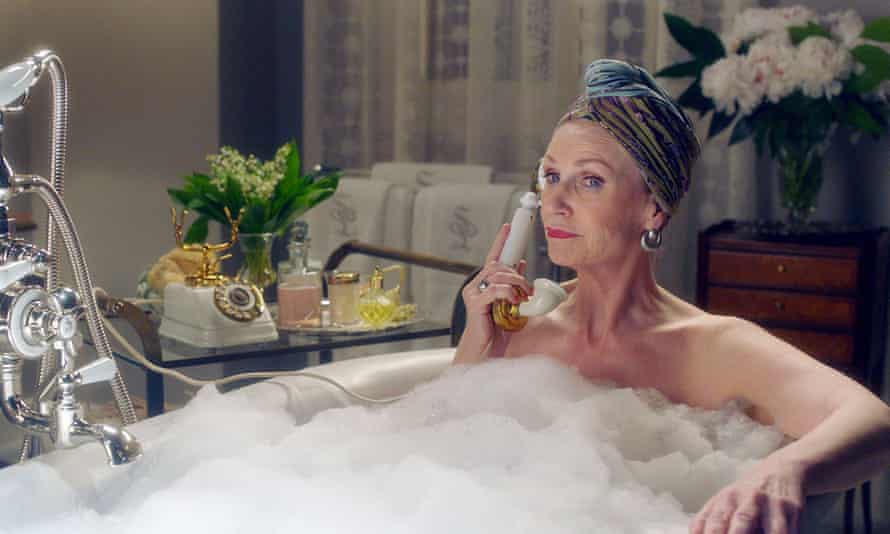
She is dazzlingly good visitor, even over Zoom. Funny and radiant, information technology's obvious why Lynch has go such a renowned scene-stealer in just almost everything she has been in. Lynch is the funniest thing in The xl-year-erstwhile Virgin, too Role Models. She has been a regular bandage member in Christopher Invitee'southward work – she has been four of his recent films, including All-time in Show and A Mighty Wind – and your eye is e'er drawn to Lynch, the tall blond woman with precision timing. She is still best known equally Sue Sylvester, the maniacal cheerleading motorbus in Glee, the musical high schoolhouse drama that ran from 2009 to 2015. At the cease of Glee, Sylvester – by at present the The states vice-president – announces her appetite to run for the presidency in 2024 (please someone, make that show). "She would be Maga," says Lynch, laughing.
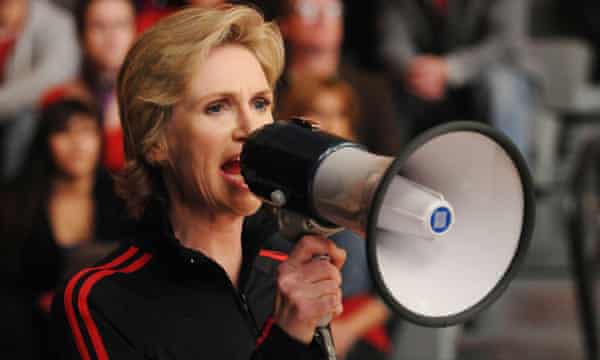
I don't know if we were describing people as "problematic" even as recently equally 2015, when Glee ended, but Sylvester goes way beyond that. As the villain, she is clearly deliberately atrocious, but I wonder if she would exist able to get away with the things she said – racist, fat-shaming – were Glee still running. "I recall there would have been people out in that location who would have wanted to abolish Sue Sylvester," says Lynch. "I don't know that we could have done that testify today, and it was but like … We started that 10 years ago." Does she recall comedy writers are 2nd-guessing how their material will be perceived? "I think so," she says. "At that place'south kind of a rabid anonymous grouping of folks who can actually modify somebody's life; they could take away their career. Some of it is nigh fourth dimension – some of these people have got chosen on their stuff [from the past]. Simply I think we get carried away. This preoccupation with going 'Aha!', that's a drag. Hopefully we'll get over that soon. I was merely thinking this morning about something that we did in Chicago called the Co-Ed Prison Sluts [it became ane of Chicago's longest-running fringe musicals]. Information technology was not politically correct; it would not go over well today."
Sophie Lennon in The Marvelous Mrs Maisel is another megawatt grapheme. The Amazon Prime show ready in 1950s and 60s New York follows a young housewife, Midge, who becomes a standup star. Lennon is the sometime baby-sit, a rare adult female who has made it. "What Sophie was dealing with, as information technology continues to be the deal actually, is that information technology'southward a homo's game," says Lynch. "In society to break through, you had to have material that spoke to men because the club owners were men, the Telly producers, the late-night hosts." Things have conspicuously improved for women in comedy, although mayhap not by much. Lynch isn't a standup, merely she has heard female comics talk about their experiences. "Any time you look at a comedy guild, the headliners are guys. Every one time in a while, they might throw a woman in there. Information technology's harder to work your fashion upwardly as a adult female and, similar anything else where you're trying to interruption a mould, you accept to be exceptional."
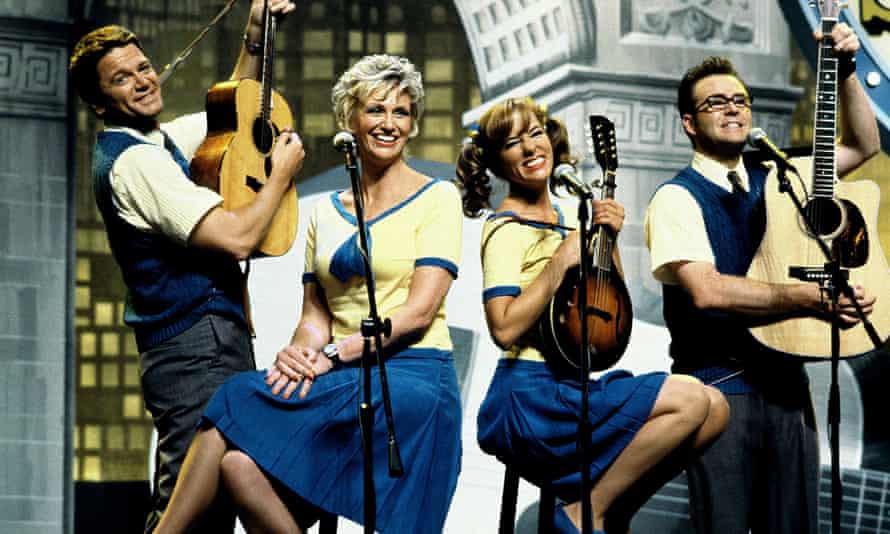
Photograph: AF archive/Alamy
In the terminal serial, Sophie unravelled after a disastrous attempt to be a "real" theatre actress on Broadway, slipping back into her shtick equally a Queens housewife. "I understand her," says Lynch. "She is really talented and smart but insecure, and is so afraid of existence found out." She is embarrassed of her act, says Lynch, "even though information technology's made her rich and made her a star. She wants to do more, like and so many of us in the interim profession: 'Don't typecast me. I'1000 more than than simply this.'" How much of that describes Lynch? "Oh, non at all," she says, laughing. "I'll do the same thing over and over again. I don't care. I love information technology."
Many of Lynch'south roles were originally written for men, which goes some way to explain why she often plays such deranged authority figures. "I'thou obsessed with that random exercise of ability, power for power'due south sake," she says, especially if they also have an element of the ridiculous well-nigh them. "God forbid they accept real ability." Donald Trump is the obvious example. "He was kind of that guy that we used to express joy at. Look at that goof." She most spits out the give-and-take.
Lots of Lynch'southward characters seem driven past insecurity, as if they have something to prove, or need to count in some mode. Reading Lynch's 2011 memoir, there is something of that in Lynch'due south life too. "Oh, admittedly," she says. "Fanny Brice had this also," she says of the Broadway star on whose life Funny Girl is based. "Comparison myself to Fanny Brice! Please forgive me. I call back a lot of us feel this way, but especially actors. You take something inside of you that you know is fantastic and nobody knows. Fanny says: 'I'm the greatest star, but no 1 knows information technology.' And I had that as a kid: I was in a niggling suburb that didn't get the nuance of my one-act. Sometimes even with my ain family unit – and I was brought upwardly by pretty funny people – I would do something and they'd just scroll their eyes. It was like, 'Somebody see me!'" She laughs.
Lynch grew upwards outside Chicago, her childhood the moving picture of American suburbia: her male parent went to work in a bank and her parents would accept cocktails on his render. Lynch had e'er thought she was "a depressed child" just she recently saw some domicile movies of herself and was struck past how full of life she was. "Always dancing to the camera; air guitar. I was a real gratis spirit and I loved to perform. And so, of grade, high school happens, and maybe even earlier that when you start to realise: 'Oh my God, I may be gay merely I don't even take a word for it.'" She longed to be on stage just, carrying and then much shame – she'd heard school friends talk almost gay people with disgust – she was besides afraid of being so visible. Lynch was cast in a play but walked out. "The fear started to come in, and the light that I think I projected as a younger person just started to get deep inside."

Glee was praised for its portrayal of LGBT teenagers. What would information technology have meant to have had a evidence like that when she was growing up? "It would have been such a relief," says Lynch. "If I had something similar Glee, where information technology was stories that you could relate to on a deep level, that perchance as a person in loftier school you lot couldn't express, yeah, I would take loved it. I don't mean to overstate information technology, but I practice think it might actually accept helped a lot of kids."
In her book, she wrote that one of the few times she felt "condom" was while acting, playing a part. "I however feel that manner. These people have to talk to me because they have to say lines," she says with a laugh. "I was always afraid of being thrown away, socially. Like if someone really saw what was inside of me, they wouldn't want me. And the peachy thing nigh being in a play is they tin can't – at least for the time you're on stage."
Lynch had started drinking as a teenager and carried on, drinking well-nigh every day, into her 30s. "The first time you [have a potable], it'due south like: 'Ah, I found it. I feel happy in my body, this feeling of elation. No one tin say anything to me that would make me upset or feel badly about myself right now.' And then maybe the next fourth dimension you potable, you get it again. Before you know it, it's not doing it for you. So for the nearly part, when I was in the throes of addiction, it wasn't working. You stop up chasing [that feeling]. Then if y'all're not chasing that, what are yous doing? Who are you? Yous take to really face up this emptiness."
She was a functioning alcoholic, working steadily in theatre, even if some nights she would still be in the bar at 7am the next morning, or would discover vomit in her bathroom and have no idea how information technology got there. 1 twenty-four hours, she just decided to stop, "a kind of magical lifting of my compulsion to drink", poured her glass of wine down the sink and joined Alcoholics Anonymous, which she loved. "I felt sorry for people who weren't alcoholics: I merely loved AA," she says, grinning. "Information technology was very much a gift; it was almost like I was struck sober."
It stuck, until nigh v years ago, when Lynch thought she'd had enough therapy and was grownup plenty to bask a glass of wine with dinner. "And I loved information technology," she says, deadpan. "I became a connoisseur of vino in a way that only an alcoholic can. I went back into deprival, after all those years of sobriety and self-knowledge. I fooled myself – I woke up one day and went: 'I'k back.' It took about 3 years. I'm telling people I'1000 drinking 1 glass of wine a nighttime, and I'm drinking v." She wouldn't allow herself to drink until 5pm. "I was tied to this thing once more, to some promise of what information technology was going to practise for me, and the rest of the twenty-four hours didn't affair. The only office of the day that really mattered was v o'clock."
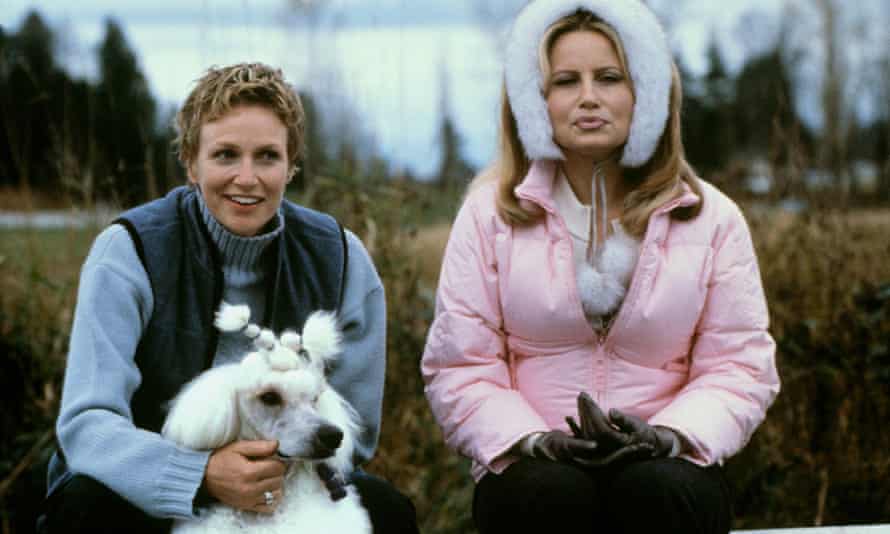
What was going on for her at that time? Her career was going brilliantly, although she had come out of a divorce from her first wife a couple of years earlier. "I think colorlessness," she says. "I retrieve I got to a point where nothing was doing information technology for me any more." Was she surprised to find herself back there? "Yep," she says. "I was a little ashamed, and as well the deprival, the justifications. My friends were fooled. I call up a friend said: 'I told you you're not an alcoholic whatever more than.' I'd go: 'I know!'" A perfectly timed grimace. "I was."
Lynch wonders aloud to herself if she was drinking when she started filming Mrs Maisel, merely thinks not. "I was during The Good Fight, though. I couldn't wait to exist done and go have a drink by myself." She was, she says, "scared of it". She remembers going to a Glee effect, negotiating with herself: "I'm not going to drink on the plane, but as soon as I get to the hotel I'm going to have a beverage." And she remembers thinking, "Shit, did I squander this?" when reflecting on her years of sobriety and what information technology had brought her: a successful career; a good therapist who had given her the courage to come up out to her family. It took Lynch another six months to stop. Again, she says she was struck sober, "like the sober fairy said: 'OK, I'yard giving yous 1 more than chance.' And it was over. Five o'clock would come up and I didn't observe it."
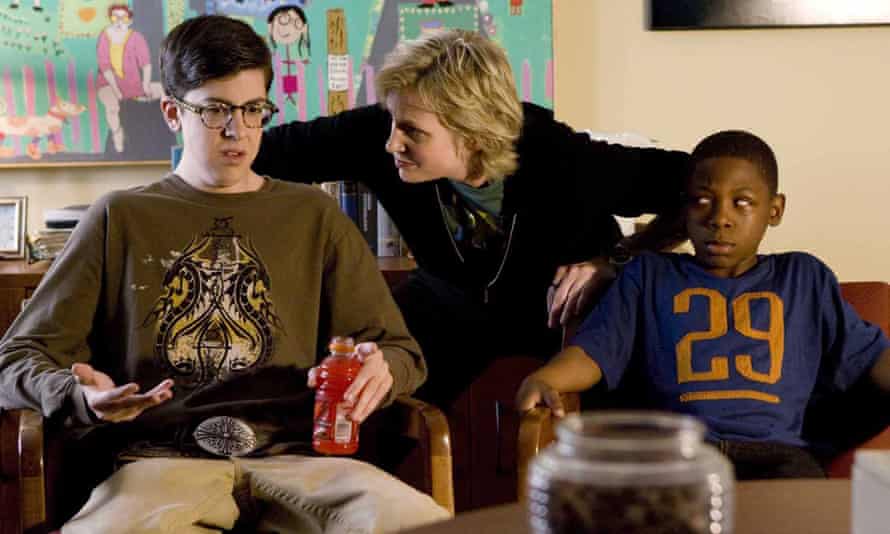
Subsequently the first time she got sober, Lynch spent years working difficult every bit an thespian, taking any she could get – theatre, TV and motion-picture show roles, adverts, voiceovers. "I just had a lot of white-hot appetite," she says. She wrote and performed in a i-woman testify, which "blew the doors off my confidence". The sadness she had been feeling began to dissolve. "I was just in a really good space and all of that loneliness and alienation didn't take a identify to state any more."
She met Christopher Invitee on a breakfast cereal advertizing he was directing, then bumped into him in a coffee shop several months later; he offered her a part in Best in Prove, which gave Lynch's career every bit a character actor a huge boost. Information technology must have also given her great confidence to exist i of Guest's chosen people, alongside actors such as Eugene Levy and Jennifer Coolidge. "Oh, yeah," she says. "John Michael Higgins [another Guest regular] e'er says information technology's a preposterous fantasy come true."
Lynch was 40 when Best in Show came out; she was nigh 49 when Glee made her a star. Throughout all the knockbacks – amid them, she was part of the renowned Chicago improv theatre grouping The Second City simply was told she'd never arrive to their main phase – she kept faith that information technology would work out. Even as a child, her mother warned her that she would probably never become a successful histrion, and when she wrote a letter to the head of casting at Universal Studios – Lynch was thirteen and had permit them know her availability – she received a letter back that would accept crushed most children. She carried on. "All I knew was that I loved doing it," she says, smiling. Lynch was having this chat recently with her friend Kate Flannery. "We always say 'we're of bear witness' considering we'll practise it no thing what."
Season iv of The Marvelous Mrs Maisel begins on Amazon Prime Video on 18 Feb.
Source: https://www.theguardian.com/culture/2022/feb/16/the-sober-fairy-gave-me-one-more-chance-glees-jane-lynch-on-alcoholism-ambition-and-the-return-of-mrs-maisel
Post a Comment for "Oh No Its Doing It Again Alcoholic Comic"